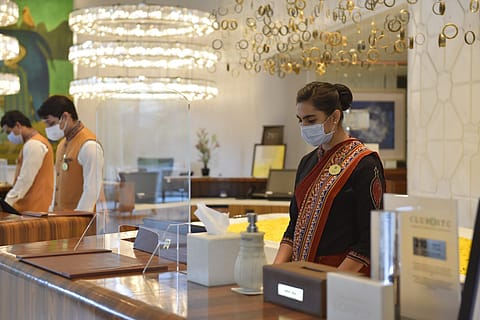Budget 2022: ₹50,000 crore earmarked for hospitality in ECLGS extension
Industry stakeholders have welcomed the move, which is touted to provide immediate relief to the struggling sector

In her budget speech, finance minister Nirmala Sitharaman has announced that the Emergency Credit Line Guarantee Scheme (ECLGS) for the hospitality sector will be extended to March 2023. “The hospitality and related services, especially those by micro and small enterprises, are yet to regain their pre-pandemic level of business. Considering these aspects, the ECLGS will be extended up to March 2023 and its guarantee cover will be expanded by ₹50,000 crore to total cover of ₹5 lakh crore,” she says. The additional ₹50,000 crore is earmarked exclusively for hospitality and related enterprises.
“We recognise that post the second-wave, the hospitality sector is in difficulty and needed support; the tested and proven formula was the ECLGS. Since that worked out well for the MSMEs, we thought that formulation was the best to be adopted. We want the hospitality and contact-intensive sectors to benefit from it,” the minister adds in the post-budget press conference.
"By announcements made for the hospitality industry in Union Budget 2022, the government has shown that it understands the situation and plight of the industry, which has struggled to survive in the pandemic," says Manbeer Choudhary, chairman cum managing director, Jewels Group of Hotels. He adds that the extension of ECLGS and allocation of additional ₹50,000 crores for hotels and hospitality sector till March 2023 has brought a wave of relief to the industry.
Kabir Jeet Singh, the CEO and co-founder of the Burger Singh franchise of restaurants, concurs with Choudhary. “The hospitality sector has been hard hit by the lockdowns and seating regulations due to the pandemic. The extension of the ECLGS by one more year, with an additional amount being earmarked exclusively for the hospitality and related enterprises is a big boost to the sector,” he says. He expects that this move will strengthen investments and create millions of additional jobs.
The government’s decision comes at a time when the Omicron variant — which has been the major perpetrator in the third-wave — has created an impediment for the hotel industry which was snarling on the long, uphill road to recovery, after demand crashed during the dreaded second wave. Most states imposed partial lockdowns to curb the rise in infections which started from January 2022. Consequently, a lot of people deferred travelling—be it leisure or for business. The number of people allowed to attend weddings — a major revenue-generating event for hotels — was also reduced drastically.
According to a monthly report by ICRA, occupancy dipped to about 30% in January 2022, after reporting a healthy pan-India premium hotel occupancy rate of more than 50% in the Q3 2022. “For 10M FY2022, ICRA estimates the pan-India premium hotel occupancy to be about 40-42% (up from about 22-24% in 10M FY2021),” the report reads. A dip in the average room rate (ARR) was also observed. “Pan-India ARRs are estimated at about ₹4,200-₹4,400 for 10M FY2022, at a 25-30% discount to pre-Covid levels.”
The road ahead for the hospitality sector still looks disillusioning. “About 51% of ICRA’s ratings are on a negative outlook currently. Return to pre-Covid revenues and profits is likely only by FY2024,” the report adds. The situation is evolving, albeit Meetings, Incentives, Conferences & Exhibitions (MICE) for corporate and other purposes is yet to recommence after coming to a grinding halt.
Recommended Stories
The ECLGS was launched by the Government of India as a special scheme in view of Covid-19 crisis. The finance minister has also said in her speech that the credit guarantee scheme has provided much-needed additional credit to more than 130 lakh MSMEs — helping them mitigate the adverse impact of the pandemic.
The finance minister has also said in the Budget speech that an additional 25,000 km of National Highways, 400 new Vande Bharat Trains, and the introduction of the ePassport. Choudhary believes that these measures will be instrumental in encouraging both international and domestic travellers to explore the country with ease and give a new lifeline to hospitality brands of all sizes. “This will encourage better investment by the hospitality brands in the country and generate more economic traction,” he adds.